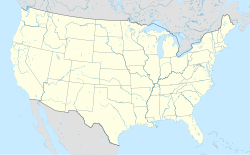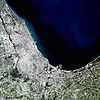Oakwood Hills, Illinois
Oakwood Hills, Illinois | |
|---|---|
 Location in McHenry County, Illinois | |
| Coordinates: 42°14′52″N 88°14′43″W / 42.24778°N 88.24528°W | |
| Country | United States |
| State | Illinois |
| County | McHenry |
| Townships | Nunda, Algonquin |
| Founded | 1959 |
| Area | |
• Total | 1.17 sq mi (3.04 km2) |
| • Land | 1.09 sq mi (2.82 km2) |
| • Water | 0.08 sq mi (0.22 km2) |
| Elevation | 825 ft (251 m) |
| Population | |
• Total | 2,076 |
| • Density | 1,908.09/sq mi (736.58/km2) |
| Time zone | UTC-6 (CST) |
| • Summer (DST) | UTC-5 (CDT) |
| ZIP code | 60013 |
| Area code | 224 |
| FIPS code | 17-55041 |
| Wikimedia Commons | Oakwood Hills, Illinois |
| Website | www |
Oakwood Hills is a village in McHenry County, Illinois, United States. It was founded in 1959.[3] The population was 2,076 at the 2020 census.[2]
Geography
[edit]Oakwood Hills is located in southeastern McHenry County at 42°14′52″N 88°14′43″W / 42.24778°N 88.24528°W (42.247658, -88.245176).[4] It is southeast of Prairie Grove, east of Crystal Lake, and north of Cary. The Fox River passes 1 mile (1.6 km) to the east. Downtown Chicago is 46 miles (74 km) to the southeast.
According to the U.S. Census Bureau, Oakwood Hills has a total area of 1.17 square miles (3.03 km2), of which 1.09 square miles (2.82 km2) are land and 0.08 square miles (0.21 km2), or 7.17%, are water.[1] Silver Lake is in the western part of the village, draining east to the Fox River. The unincorporated community of Silver Lake borders Oakwood Hills to the south.
Demographics
[edit]| Census | Pop. | Note | %± |
|---|---|---|---|
| 1960 | 213 | — | |
| 1970 | 476 | 123.5% | |
| 1980 | 1,255 | 163.7% | |
| 1990 | 1,498 | 19.4% | |
| 2000 | 2,194 | 46.5% | |
| 2010 | 2,083 | −5.1% | |
| 2020 | 2,076 | −0.3% | |
| U.S. Decennial Census[5] 2010[6] 2020[7] | |||
| Race / Ethnicity (NH = Non-Hispanic) | Pop 2000[8] | Pop 2010[6] | Pop 2020[7] | % 2000 | % 2010 | % 2020 |
|---|---|---|---|---|---|---|
| White alone (NH) | 2,083 | 1,931 | 1,731 | 94.94% | 92.70% | 83.38% |
| Black or African American alone (NH) | 8 | 4 | 15 | 0.36% | 0.19% | 0.72% |
| Native American or Alaska Native alone (NH) | 5 | 6 | 4 | 0.23% | 0.29% | 0.19% |
| Asian alone (NH) | 7 | 37 | 29 | 0.32% | 1.78% | 1.40% |
| Pacific Islander alone (NH) | 0 | 0 | 3 | 0.00% | 0.00% | 0.14% |
| Other race alone (NH) | 0 | 3 | 13 | 0.00% | 0.14% | 0.63% |
| Mixed race or Multiracial (NH) | 17 | 10 | 93 | 0.77% | 0.48% | 4.48% |
| Hispanic or Latino (any race) | 74 | 92 | 188 | 3.37% | 4.42% | 9.06% |
| Total | 2,194 | 2,083 | 2,076 | 100.00% | 100.00% | 100.00% |
2000 Census
[edit]As of the census[9] of 2000, there were 2,194 people, 719 households, and 598 families residing in the village. The population density was 1,943.9 inhabitants per square mile (750.5/km2). There were 736 housing units at an average density of 652.1 per square mile (251.8/km2). The racial makeup of the village was 98.04% White, 0.36% African American, 0.23% Native American, 0.32% Asian, 0.18% from other races, and 0.87% from two or more races. Hispanic or Latino of any race were 3.37% of the population.
There were 719 households, out of which 47.8% had children under the age of 18 living with them, 73.2% were married couples living together, 6.8% had a female householder with no husband present, and 16.8% were non-families. 11.8% of all households were made up of individuals, and 2.2% had someone living alone who was 65 years of age or older. The average household size was 3.05 and the average family size was 3.34.
In the village, the population was spread out, with 31.5% under the age of 18, 7.1% from 18 to 24, 35.2% from 25 to 44, 22.3% from 45 to 64, and 3.9% who were 65 years of age or older. The median age was 34 years. For every 100 females, there were 102.4 males. For every 100 females age 18 and over, there were 99.9 males.
The median income for a household in the village was $68,182, and the median income for a family was $70,875. Males had a median income of $52,051 versus $30,508 for females. The per capita income for the village was $26,397. About 3.9% of families and 5.0% of the population were below the poverty line, including 4.2% of those under age 18 and 4.3% of those age 65 or over.
Proposed natural gas power plant
[edit]This section needs additional citations for verification. (March 2016) |
During the summer of 2014, the residents of Oakwood Hills and surrounding communities voiced their concerns about the creation of a power plant, by Northland Power and Enventure Partners,[10] on property just north of the village. A group of concerned citizens hired expert Robert G. Abboud to create an impact assessment of the proposed project. The report emphasized risks to groundwater, air quality, and noise issues, among others as to why the project needed to be further studied.
See also
[edit]References
[edit]- ^ a b "2022 U.S. Gazetteer Files: Illinois". United States Census Bureau. Retrieved March 6, 2023.
- ^ a b "P1. Race – Oakwood Hills village, Illinois: 2020 DEC Redistricting Data (PL 94-171)". U.S. Census Bureau. Retrieved March 6, 2023.
- ^ Pfannkuche, Craig L. "Oakwood Hills, Illinois". Encyclopedia of Chicago. Retrieved July 26, 2016.
- ^ "US Gazetteer files: 2010, 2000, and 1990". United States Census Bureau. February 12, 2011. Retrieved April 23, 2011.
- ^ "Decennial Census of Population and Housing by Decades". US Census Bureau.
- ^ a b "P2 Hispanic or Latino, and Not Hispanic or Latino by Race – 2010: DEC Redistricting Data (PL 94-171) – Oakwood Hills village, Illinois". United States Census Bureau.
- ^ a b "P2 Hispanic or Latino, and Not Hispanic or Latino by Race – 2020: DEC Redistricting Data (PL 94-171) – Oakwood Hills village, Illinois". United States Census Bureau.
- ^ "P004: Hispanic or Latino, and Not Hispanic or Latino by Race – 2000: DEC Summary File 1 – Oakwood Hills village, Illinois". United States Census Bureau.
- ^ "U.S. Census website". United States Census Bureau. Retrieved January 31, 2008.
- ^ "Enventure Partners". enventurepartners.com.


